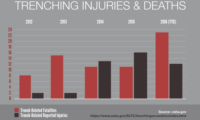Posted with permission from Confined Space, a newsletter of workplace safety and labor issues
This is not generally how a good company wants a supervisor to respond to a worker who reports unsafe conditions: “Next time you have a problem with safety, talk to me. Then get in your car and hit the f***ing road.” Then you write him up, don’t renew his contract — and, for good measure, fire his son for “talking on the job.”
But that’s how Leon Wagner, a superintendent for Oregon Department of Transportation (ODOT) contractor, Abhe & Svoboda responded to Shane Duane Luey when Luey reported unsafe working conditions, according to NW Laborpress.org.
More troubling, however, is what happened eight months later:
Abhe & Svoboda is working on a $22 million contract with ODOT to sandblast and paint the underside of the Ross Island Bridge in Portland, OR. NWLaborpress reports numerous cases of workers being intimidated for talking about safety concerns, and being retaliated against for reporting injuries.
One worker, “D.R.” described the intimidation on the job:
OSHA recently issued a regulation forbidding companies from discouraging workers from reporting injuries on the job. That regulation is facing stiff opposition and lawsuits from employer associations.
The Painters Union, which is trying to organize Abhe & Svoboda, also reports that the company actually discourages workers from using safety equipment:
Lesson Learned
Most employers want to do the right thing. Some excel, some comply with the minimum, some just do it because they’re afraid they’ll get cited if they don’t. And then there are some, like Abhe & Svoboda, who seem to be hostile to the whole idea of ensuring safe working conditions — especially if it might cost more or slow down the job. For these employers — and those who just comply with the law because they’re afraid of being fined — you need a strong, and well funded, OSHA enforcement program. And workers need to know about unsafe conditions, what to do about them and their rights on the job. Finally, workers need to be able to work — and discuss safety issues — free from the threat of retaliation. That’s why OSHA ensures that workers know about their rights, and why OSHA has the Susan Harwood Training program to provide training to workers on workplace safety and health, and their rights. And a strong union helps as well.
OSHA’s budget, the Harwood Program and workers rights are currently under attack by the Republican led Congress and the Trump administration. Make sure your Congressional representatives know how important a strong, well-funded enforcement program is.
Click here to visit Confined Space.








